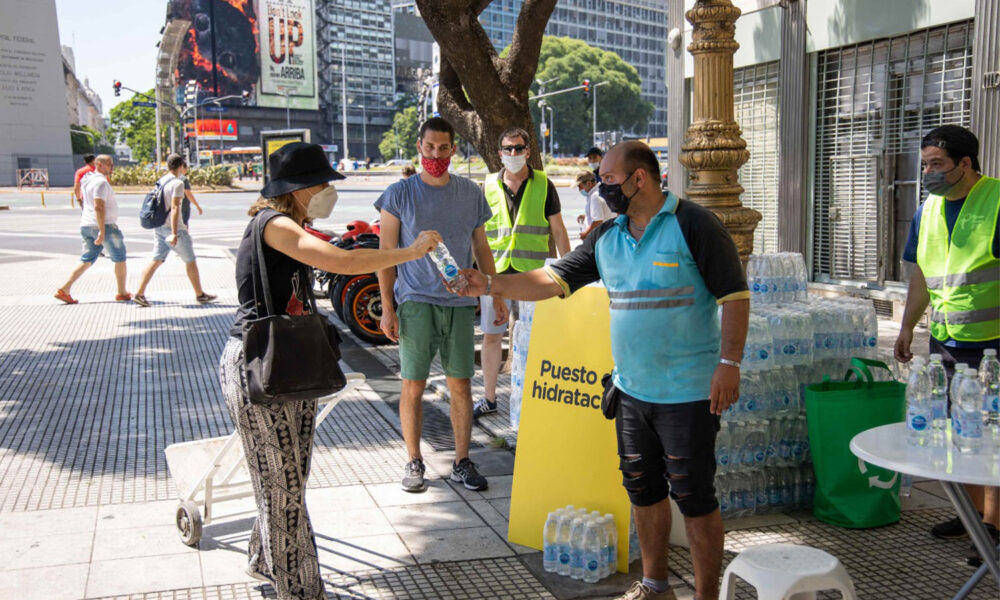While a record-setting Arctic cold blast gripped the US, a record-setting heatwave has enveloped parts of South America for much of the last few months. When we are in the midst of brutal winter storms in the Northern Hemisphere, it can be easy to forget that it’s summer in the Southern Hemisphere.
And just like summertime in the US, this period (December, January, and February) has transformed into a “danger season” as a result of climate change, replete with deadly heatwaves, drought, and wildfires.
A historic heatwave and drought
I have been visiting family in Rosario, Argentina, since early December, where heat has been unrelenting with very few days of relief. Rosario is a major grain-exporting port city that sits along the Paraná River, approximately 200 miles northwest of Buenos Aires (and is famously Lionel Messi’s home city).
Since mid-November, 60 out of the last 90 days have had a maximum temperature over 90°F (versus 24 days historically). Thirty-three of these days have been over 95°F (versus about 7 days historically), and 16 have been over 100°F (versus about 1 day historically). And that’s not even including humidity—used to calculate the “feels like” temperature—which I can promise you has been brutal, making it too hot to do much outside at times.
In fact, a recent study examined parts of this heat wave—from late November up until December 11, 2022—and found that climate change made the event 60 times more likely. Sixty times more likely is a remarkable figure to me. As a climate scientist, I’m used to reading attribution numbers on the order of magnitude of 15, 20, or maybe 30 times more likely. In addition to much of the northern half of Argentina, the heatwave considered in the study has also affected southern Bolivia, central Chile, as well as much of Paraguay and Uruguay.
Another study, released in 2023, found that the ongoing heatwave has exacerbated the effects of a catastrophic, multi-year drought that has been affecting the broader region. This heat and drought have, among other impacts, led to deadly wildfires in Chile and decimated the yields of key crops in Argentina, including soybean and corn (Argentina is one of the main countries the US imports soybean from).
As a result, key agricultural export revenues have decreased in Argentina by 61 percent over the last year, adding economic strife during an already serious economic recession.
Small contributions, outsized consequences
The climate crisis is an unavoidable reality across South America right now. With so many vulnerable communities—for example, an estimated 42 percent of Argentina’s population lives below the poverty line—the consequences can be heartbreaking.
When passing informal settlements that lack air conditioning, I wonder on extreme heat days how residents (who include babies and older people alike) stay safe. Just the other day when temperatures were soaring, a man drenched in sweat stopped my family to ask for help as he had just been released from a drug rehabilitation center and is now living on the streets. While we gave him money, how helpful will that be when even the very act of being outside is dangerous?
It’s all the more maddening when you look at who is responsible for climate change and consider that there are people, corporations and countries that are getting rich off the climate crisis.
Study after study has shown that the fossil fuel industry, for example, knew about the climate-related impacts of their products and yet took intentional measures to disinform people and thwart climate action so that people in the US and around the globe would remain hooked on their products. These same companies have been reporting record profits, with ExxonMobil, Shell, BP, Chevron, and TotalEnergies making, combined, nearly $200 billion in profits last year alone.
At the country-level, the United States is the largest historic contributor to the climate crisis, having contributed about one quarter of all carbon dioxide emissions (the main driver of global warming) between 1750-2020. In 2019, Brazil was the only South American country that made it into the top 20 carbon dioxide emitting countries list, contributing one percent of the emissions that year, as compared with 14 percent by the United States.
Time for change
So while winter unfolds in the United States, it’s important to remember that it’s danger season somewhere else. There are real people in real places both at home in the US and abroad suffering very real consequences from fossil fuel companies’ intentional actions and the slow political actions being taken by policymakers. It’s past time to hold these companies and our decision makers accountable.
You can contribute to this effort by writing a letter to your US senator urging them to advance the congressional investigation into fossil fuel company disinformation practices with respect to climate change. By holding these companies accountable, we would finally stand a chance to get off of fossil fuels the way we need to and limit how bad danger season will get.
And there would be some justice. Justice for those people being harmed by fossil fuel companies and the climate crisis they have caused, including those imperiled during what has now become danger season.

